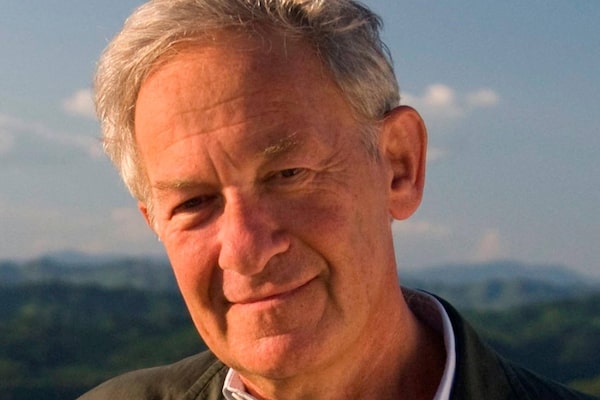
Simon Schama.
Simon Schama is an award-winning author whose books include Citizens: A Chronicle of the French Revolution, Landscape and Memory and Rough Crossings: Britain, the Slaves and the American Revolution. His New Yorker columns earned him a National Magazine Award for criticism, and he is a contributing editor at the Financial Times. He is also a professor at Columbia University. Schama's latest book is Belonging: The Story of the Jews 1492-1900.
What's the best advice you've ever received?
"Be brave," the last words of my father before he died.
Which fictional character do you wish you'd created?
Chandler's Philip Marlowe gumshoe as wise-cracker, supreme observer of the human condition. Nothing passes him by: poor taste in interior decoration; a smudge of lipstick; a certain something on someone's breath; the possibility of a decent cop; a telling touch of tinny in a nervous chuckle. And yet, he's also a hopeless sap, the hardest-boiled softest-centred romantic in fiction. I once tried out a more down-at-heel version called Slug Grogan. My pal liked it. Time I put Slug back on his barstool where he belongs.
What question do you wish people would ask about your work (that they don't ask)?
"Why does poetry matter so much to your writing about the past?" It is, in fact, the indispensable discipline – reading it, that is; I once tried it when stung by a girlfriend and gave up after the first unsuccessful ornithological metaphor.
Which book do you think is underappreciated?
Albert Cohen's Belle du Seigneur, but also the whole Solal trilogy. Cohen is the great unacknowledged comic genius of 20th-century fiction – risky; outlandish; copious; very, very Jewish; and eloquent. But also, like the best comic writers, profound, melancholy, mordant, devastating – especially about love. Cohen was a great Herculean mind but also an official in the League of Nations in the 1930s, evidently a bed of nails but one which made him the great droll observer of the black comedy of diplomacy and the madness of bureaucracy. No one will ever write a more hilarious diplomatic cocktail party. Characters tend to give speeches over several pages, but believe me, you won't mind.
Which books have you reread most in your life?
War and Peace. Next time will be my tenth reading. Sometimes I skip around in translations, but they have to have kept the French passages untranslated. Pevear and Volokhonsky is by far the most satisfying version. Nothing important in human life is missing from Tolstoy's pages – the rage to power; the futile energy spent on schemes political and erotic; the swell and collapse of friendship. But the important things come at you sideways and often in sharp close-up like the fuzz on Lisa's upper lip, which is a tipoff to Andrei's irritation. As always with Tolstoy, the most revealing passages can be the quietest: Pierre's hopelessness at his shopping assignment in the epilogue; Dolokhov's only redeeming weakness, his devotion to his mother; Platon Karateyev's goodnight prayer. You don't really read this book so much as live it. Mind you it makes you a complete pill to be around during the journey as you're not much interested in anything or anyone else.
Is there a book you consider a guilty pleasure?
Evelyn Waugh's Scoop. "Feather-footed through the plashy fen passes the questing vole" – the line sings to me as I pass the Waugh shelf in my library – just one more hoot with Boot. Stupendously politically incorrect and generally outrageous, so all the more delicious on yet another reading. But there isn't much Waugh I don't love. Brideshead is a bit mushy, though has one of his great openings. But it was his endings which were startlingly brilliant, the place where he was most brilliant: the eye-poke ending of Vile Bodies; and the most terrifying of all in A Handful of Dust; so terrifying, in fact, that Waugh's American publisher demanded a different and less merciless conclusion, whereupon Waugh produced something ostensibly kinder but in fact a conclusion of ashen cynicism. Two endings, in bleakness competition – that's what I call a writer.
What's the best romance in literature?
Florentino and Fermina in Gabriel Garcia Marquez's Love in the Time of Cholera because of the undimmed intensity of the passion into the time of life when it's supposed to have been replaced by comradely comfort. Everything about their world – its unforgiving heat; the fragrance and the ripening rot; the alchemy and the eloquence – are registered with maximum intensity the way a great love story ought to be unfolded. And like the greatest love stories, there is, really, no happy anything, just the odd bolt of ecstasy.